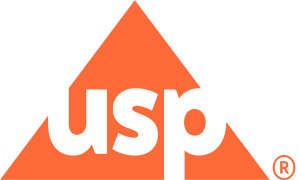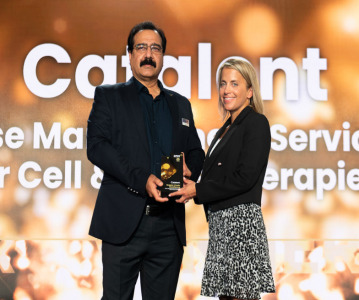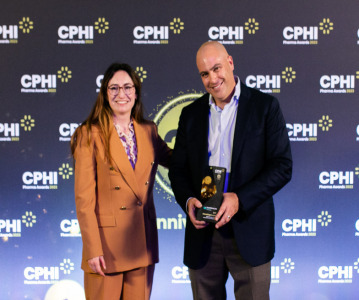On track at CPHI Barcelona - The Track Sponsor interview: USP
.png)
In our packed out content sessions at CPHI Barcelona this year we focus on some of the hottest topics coming up in the pharma industry, with each track sponsored by a leading expert in the field.
Our Quality Management Fundamentals tracks, sponsored by the US Pharmacopeia, explores the importance of quality control and management within the pharmaceutical supply chain. We caught up with John A. Giannone, VP – Global Commercial Operations at the USP, to discuss how the USP prioritises quality above all else, and what manufacturers should take away from this track.
Could you please give an overview of the U.S. Pharmacopeia and what your key priorities are as a non-profit organisation?
USP is the standard-setting organisation for the official pharmacopeia for pharmaceuticals approved for use in the United States. This includes all dosage forms, active pharmaceutical ingredients, and excipients. We also set standards for dietary supplements and conventional food ingredients. We are a global organisation with offices in the United States, South America, Europe, China, South Asia, Asia Pacific, and Africa. Our main goal is to help ensure global public health by setting quality standards for medicines, supplements, and foods. Our priorities are quality, quality, quality!
USP are sponsoring CPHI Barcelona’s ‘Quality Management Fundamentals’ track – what are some key takeaways from this track? What ARE some of the fundamentals for quality control and management within the pharmaceutical supply chain?
The term quality has such a broad meaning. We decided to sponsor this track to level set and gain alignment around fundamental concepts, especially as the industry evolves with new technologies and new products. Do traditional approaches, maybe even definitions, apply to medicines produced in biologic systems or do we need to think differently? What happens to the quality paradigm developed in a batch production world as we move to continuous manufacturing, process analytical technology, and advanced manufacturing technology where even the definition of “batch” is flexible and statistical trends become the basis for decisions. This track explores these issues. We also take a broad view of the pharmaceutical supply chain, beyond the bounds of medicine manufacture. We explore the fundamentals such as the need to know you are partnered with the right suppliers, you have a full understanding of the tolerances and capabilities of your production and have clarity of the fitness for purpose of your raw materials and test methods.
What challenges face the pharmaceutical manufacturing sector concerning quality control and management?
Beyond the changing production landscape, the financial pressures (whether driven by global economics or government action), and competitive pressures, the pharmaceutical manufacturing sector is still recovering from the effects of the pandemic. Supply chains are still stretched, with some suppliers and even some competitors disappearing, leaving in their wake shortages of raw materials and finished goods in an industry that is not designed for quickly shifting resources or adding capacity due to capital requirements and needed regulatory approvals. What this sometimes means is medicine manufacturers try to accelerate identification and approval of new suppliers of raw materials and raw materials supplies, sometimes pushing production above design. Both can lead to quality issues from not fully understanding the impact of a new supplier on the quality of your product. These situations demand more resources to move quickly, but in a manner that is designed to protect the quality of medicines.
As an example, poor quality excipients containing diethylene glycol and ethylene glycol are still causing harm despite a long and well publicised history of issues, changes to standards to make clear what testing must be done, new approaches to make the supply chain more transparent, and multiple warnings by regulatory agencies.
What do you hope to bring to CPHI Barcelona with the Quality Management Fundamentals track?
We hope this track opens a global dialogue about risks to quality to build a stronger understanding of how those risks are presenting themselves. We view this as a topic that needs ongoing discussion.
How do events like CPHI Barcelona help to accelerate these track fields in the wider pharmaceutical industry?
CPHI Barcelona brings together all of the right voices to discuss these kinds of issues. New companies and those new to the industry learn more and add their voice to the dialogue by highlighting their challenges. Well-established companies bring their long and deep experience and perspective and transfer that knowledge. In all, there are few places where you can have access to such a diverse gathering of experts and those thirsty to learn.
Related News
-
News CPHI Pharma Awards 2023 – Supply Chain Excellence Winners: Catalent Case Management Services
After another year of impressive nominations for the CPHI Pharma Awards our winners were announced at CPHI Barcelona in October. In this series of interviews, we speak to the people and teams behind the award-winning projects, concepts, and technologie... -
News CPHI Pharma Awards 2023 – API Development and Innovation Winners: Snapdragon Chemistry, a Cambrex Company
After another year of impressive nominations for the CPHI Pharma Awards our winners were announced at CPHI Barcelona in October. In this series of interviews, we speak to the teams behind the award-winning projects, concepts, and technologies. -
News Navigating the Future: Challenges and Opportunities in Pharma Innovation and Investment – CPHI Barcelona 2023 Roundtable Report
In this comprehensive downloadable report, hear from a range of experts in finance and investment in the pharma industry on what investment trends will be shaping the future of the industry, in Catalonia, and the wider world. -
News CPHI Barcelona 2023: Partnering for Success – Managing Outsourcing Relationships to Optimise Manufacturing Operations
During CPHI Barcelona 2023, insightful content sessions offered attendees the chance to explore trending topics with expert speakers and panellists. Here, we summarise what the pharma industry and supply chain are talking about the most. -
News CPHI Podcast Series: The 2023 Retro – what have we learnt from the past year in pharma?
Welcome to the last episode of 2023! Digital Editor Lucy Chard is joined by her teammates in a special retrospective episode to close out the year. Guests Vivian Xie, Editor for CPHI Online and Tara Dougal, Content Director for Pharma, discuss their hi... -
News CPHI Pharma Awards 2023 – Accelerating Innovation Winners: React4Life
After another year of impressive nominations for the CPHI Pharma Awards our winners were announced at CPHI Barcelona in October. In this series of interviews, we speak to the teams behind the award-winning projects, concepts, and technologies. -
News CPHI Pharma Awards 2023 – Regulatory & Compliance Winners: Lambda Therapeutic Research Ltd.
After another year of impressive nominations for the CPHI Pharma Awards our winners were announced at CPHI Barcelona in October. In this series of interviews, we speak to the teams behind the award-winning projects, concepts, and technologies. -
News CPHI Barcelona 2023: Loading Potential – Artificial Intelligence for Pharma Manufacturing
During CPHI Barcelona 2023, insightful content sessions offered attendees the chance to explore trending topics with expert speakers and panellists. Here, we summarise what the pharma industry and supply chain are talking about the most.
Position your company at the heart of the global Pharma industry with a CPHI Online membership
-
Your products and solutions visible to thousands of visitors within the largest Pharma marketplace
-
Generate high-quality, engaged leads for your business, all year round
-
Promote your business as the industry’s thought-leader by hosting your reports, brochures and videos within your profile
-
Your company’s profile boosted at all participating CPHI events
-
An easy-to-use platform with a detailed dashboard showing your leads and performance








.png)